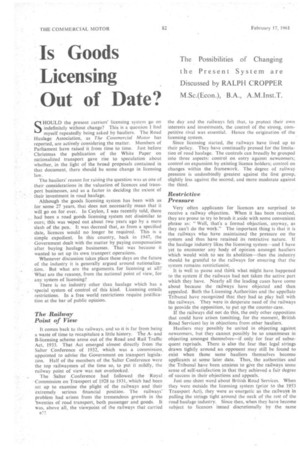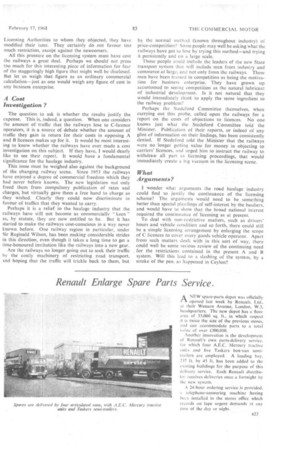Is Goods Licensing Out of Date?
Page 56

Page 57

If you've noticed an error in this article please click here to report it so we can fix it.
The Possibilities of Changing the Present System are Discussed by RALPH CROPPER M.Sc.(Econ.), B.A., A.M.Inst.T.
SHOULD the present carriers' licensing system go on indefinitely without change? This is a question I find myself repeatedly being asked by hauliers. The Road Haulage Association, as The Commercial Moior has reported, are actively considering the matter. Members of Parliament have raised it from time to time. Just before Christmas the publication of the White Paper on nationalized transport gave rise to speculation about whether, in the light of the broad proposals contained in that document, there should be some change in licensing law.
The hauliers' reason for raising the question was as one of their considerations in the valuation of licences and transport businesses, and as a factor in deciding the extent of their investment in road haulage.
Although the goods licensing system has been with us for some 27 years, that does not necessarily mean that it will go on for ever. In Ceylon, I was recently told, there had been a road goods licensing system not dissimilar to ours; this was wiped out about two years ago by a mere slash of the pen. It was decreed that, as from a specified date, licences would no longer be required. This is a simple expedient. In this country, back in 1947, the Government dealt with the matter by paying compensation after buying haulage businesses. That was because it wanted to set up its own transport operations.
Whenever discussion takes place these days on the future of the industry it is generally argued around nationalization. But what are the arguments for licensing at all? What are the reasons, from the national point of view, for any system of licensing?
There is no industry other than haulage which has a • special system of control of this kind. Licensing entails restrictions. In a free world restrictions require justification at the bar of public opinion.
The Railway Point of View
It comes back to the railways, and so it is far from being a waste of time to recapitulate a little history. the Aand B-licensing scheme arose out of the Road and Rail Traffic Act, 1933. That Act emerged almost directly from the Salter Conference of 1932, which was a commission, appointed to advise the Government on transport legislation. Half of the members of the Salter Conference were the top railwaymen of the time so, to put it mildly, the railway point of view was not overlooked.
The Salter Conference had followed the Royal • Commission on Transport of 1928 to 1931, which had been set up to examine the plight of the railways and their extremely serious financial position. The railways' problem had arisen from the tremendous growth in the 'twenties of road transport, both passenger and goods. It was, above all, the viewpoint of the railways that carried
B71
the day and the railways felt that, to protect their own interests and investments, the control of the strong, competitive rival was essential. Hence the origination of the licensing system.
Since licensing started, the railways have lived up to their policy. They have continually pressed for the limitation of road haulage. The controls can broadly be grouped into three aspects: control on entry against newcomers; control on expansion by existing licence holders; control on changes within the framework. The degree of railway pressure is undoubtedly greatest against the first group, slightly less against the second, and more moderate against the third.
Restrictive Pressure
Very often applicants for licences are surprised to receive a railway objection. When it has been received, they are prone to try to brush it aside with some convenient phrase as: " Well, that's a formal objection, anyway, as they can't do the work." The important thing is that it is the railways who have maintained the pressure on the system and thus have retained its restrictive nature. If the haulage industry likes the licensing system—and I have yet to encounter any body of opinion amongst hauliers which would wish to see its abolition—then the industry should be grateful to the railways for ensuring that the system remains restrictionist.
It is well to pause and think what might have happened to the system if the railways had not taken the active part which they have. Nearly all the leading cases have come about because the railways have objected and then appealed. Both the Licensing Authorities and the appellate Tribunal have recognized that they had to play ball with the railways. They were in desperate need of the railways to provide the opposition, to put up the counter-case.
If the railways did not do this, the only other opposition that could have arisen (omitting, for the moment, British Road Services) lay in objections from other hauliers.
Hauliers may possibly be united in objecting against newcomers, but they cannot possibly be so unanimous in objecting amongst themselves—if only for fear of subsequent reprisals. There is also the fear that legal strings drawn tightly around an opponent may still be found to exist when those same hauliers themselves become applicants at some later date. Thus, the authorities and the Tribunal have been anxious to give the railways some sense of self-satisfaction in that they achieved a fair degree of success in their objections and appeals.
Just one short word about British Road Services. When • they were outside the licensing system (prior to the 1953 Transport Act), they were as energetic as the railways in pulling the strings tight around the neck of the rest of the road haulage industry. Since then, when they have become subject to licences issued discretionally by the same Licensing Authorities to whom they objected, they have modified their tune. They certainly do not favour too much restriction, except against the newcomers.
All this pressure on the licensing system must have cost the railways a great deal. Perhaps we should not press too much for this interesting piece of information for fear of the staggeringly high figure that might well be disclosed. But let us weigh that figure as an ordinary commercial calculation—just as one would weigh any figure of cost in any business enterprise.
A Cost Investigation ?
The question to ask is whether the results justify the expense. This is, indeed, a question. When one considers the amount of traffic that the railways lose to C-licence operators, it is a source of debate whether the amount of traffic they gain in return for their costs in opposing A and B licences makes up for it. It would be most interesting to know whether the railways have ever made a cost investigation on this subject. If they have, I would dearly like to see their report. It would have a fundamental significance for the haulage industry.
This issue must be weighed also against the backgrOund of the changing railway scene. , Since 1953 the railways have enjoyed a degree of commercial freedom which they had never before known. The new legislation not only freed them from compulsory publication of rates and charges, but virtually gave them a free hand to charge as they wished. Clearly they could now discriminate in favour of traffics that they wanted to carry.
Perhaps it is a relief to the haulage industry that the railways have still not become as commercially "keen" as, by statute, they are now entitled to be. But it has started to make the railways cost-conscious in a way never known before. One railway region in particular, under Sir Reginald Wilson, has been making considerable strides in this direction, even though it takes a long time to get a time-honoured institution like the railways into a new gear.
Are the railways no longer going out to seek their traffic by the costly machinery of restricting road transport, i.nd hoping that the traffic will trickle back to them, but
by the normal method (known throughout industry) of price-competition? Some people may well be asking what the railways have got to lose by trying this method—and trying it persistently and on a large scale.
Those people could include the leaders of the new State transport system that will include men from industry and commerce at large, and not only from the railways. These men have been trained in competition as being the mOtivation for business enterprise. They have grown up accustomed to seeing competition as the natural lubricant of industrial development. Is it not natural that they would immediately think to apply the same ingredient to the railway problem?
Perhaps the Stedeford Committee themselves, when carrying out this probe, called upon the railways for a report on the costs of objections to licences. No one knows just what the Stedeford Committee . told the Minister. Publication of their reports, or indeed of any glint of information on their findings, has been consistently denied. If Stedeford told the Minister that the railways were no longer getting value for money in objecting to carriers' licences, and urged him to instruct the railway to withdraw all part in licensing proceedings, that wOuld immediately create a big vacuum in thelicensing scene.
What Arguments?
I wonder what arguments the road haulage industry could find to justify the continuance of the licensing scheme? The arguments would need to be something better than special pleadings of self-interest by the hauliers, and would have to show that the broad national interest required the continuance of licensing as at present.
To deal with non-restrictive matters, such as drivers' hours and vehicle condition and so forth, there could still be a simple licensing arrangement by enlarging the scope of C licences to cover every goods vehicle operator. Apart from such matters dealt With in this sort of way, there could well be some serious review of the continuing need for the .restrictions contained in the present A and B system. Will this lead to a slashing of the system, by a stroke of the pen. as happened in Ceylon?




















































































































